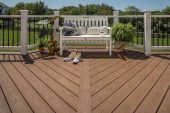Pool builder Robert Hobson knows the value of his relationships with custom home builders and appreciates the give-and-take rapport he has with them. “They want to build something that really is an eye-catcher,” says the president of Pinnacle Pools in Scottsdale, Ariz. “A lot of times when you walk in the front door, you’re looking right through the house out a massive window, and there’s this pool.”
To make the most of these mutually beneficial partnerships, follow these six rules for working together.
Make sure you’re a good fit
For home builders: Not all pool contractors have experience building at the level you need. Complicated features such as vanishing edges, fire-and-water installations, and even applying certain finishing materials require the utmost skill.Without an experienced pool builder, the final product can wreak havoc on the entire project. Rob Danieli spent a recent morning investigating repairs for two high-end installations that went bad. On one, the pool contractor had installed a perimeter-overflow system with no surge tank. The other had glass mosaic tile that was delaminating across the entire vessel. The owners didn’t know what to do. “It’s laughable, but tragic,” says Danieli, who does sales and estimates for Alka Pool Construction Ltd., in Burnaby, B.C., Canada. It appeared that the home builders awarded the pool contracts based on price.
Besides experience, check the company’s scheduling and staffing methods. “We try to get a pool contractor who’s set up the same way we are,” says Matt Trask, business director for Sanford, Fla.-based custom builder Dave Brewer Inc. “If you’re not on the same page, it can really mess up your scheduling and how you finish the home.”
For pool builders: Before taking on such work, be sure that you have enough experience with complex structures, hydraulics, and finishing materials.
Lay it all out upfront For home builders: To acquaint the pool company with a job, provide the most detailed plans possible. If you want them to take responsibility for the design, they’ll need extensive site plans. Explain the customers’ needs and thoroughly articulate your vision. If possible, the entire design should be completed, down to the last material choice, before breaking ground.
Finally, establish early on who will work with the homeowner. Some prefer the pool builder to be the liaison, since they are closest to the final product. Others take a different approach. “The homeowner probably doesn’t have experience in making the correct decisions, and the subtrades might be too technical to express themselves properly to them,” Danieli says. “After a while, the home builder develops a relationship and trust with the owner.”
For pool builders: It’s easiest to overlook the mechanical aspects of a job, such as how much room the equipment will need. Discuss this up front, so the home builder can make it fit. “We end up with pumps jammed up against walls, and pool service guys hate us,” Hobson says. Make it clear that the space you designate be used solely for pool equipment, not for throwing in the odd air-conditioning unit. Also find out where the pad will be placed, so you can correctly calculate hydraulics based on how far the water has to travel.
Specify who will bring the electrical wiring to the equipment, particularly if you plan to put a computerized controller in the house.



